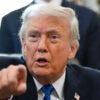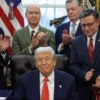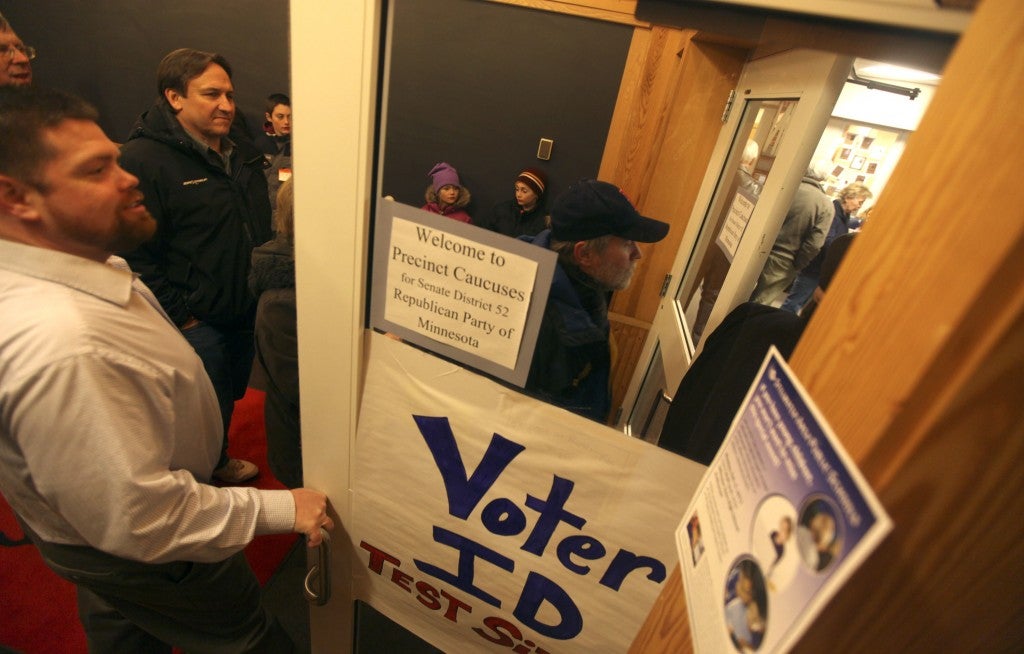The latest attack on voter ID is occurring in Minnesota, where on Tuesday, the state Supreme Court will hear a case filed by the League of Women Voters (LWV).
In League of Women Voters Minnesota v. Ritchie, the LWV is trying to convince the court to remove a referendum question from the November ballot. Its argument is that voters won’t be able to understand the ballot question.
This referendum was passed by the Minnesota legislature in April and would amend the state constitution to require all voters voting in person to “present valid government-issued photographic identification before receiving a ballot.” The amendment would also require absentee voters to be “subject to substantially equivalent identity and eligibility verification.”
In Minnesota, once a constitutional referendum has been approved by the legislature, it has to be approved by the voters of the state. But unlike some states that simply put the entire constitutional amendment on the ballot, Minnesota puts a shorter summary of the referendum. There have been 213 prior ballot questions decided by Minnesota voters, and the legislature has typically provided voters with a single-sentence description. The legislature designated the ballot question for this constitutional amendment as:
Shall the Minnesota Constitution be amended to require all voters to present valid photo identification to vote and to require the state to provide free identification to eligible voters, effective July 1, 2013?
According to LWV, this ballot question is “so fundamentally unfair and misleading that it evades the constitutional requirement to submit the proposed constitutional amendment to a popular vote.” In other words, Minnesota voters are too dumb and ill-informed to understand a ballot question that says that it will amend the state constitution to require photo ID of all voters.
To no one’s great surprise in Minnesota, the ACORN-endorsed secretary of state, Mark Ritchie, who helped Al Franken pull the 2008 Senate race right out from under Norm Coleman, refused to file an answer to the lawsuit. That indicates that he agrees with the plaintiff and would no doubt like to lose the case (what is called collusive litigation in legal circles).
The Minnesota legislature intervened in the case to defend the ballot referendum and hired a prominent Minnesota law firm, Winthrop & Weinstine, to protect the interests of the Minnesota legislature and, most importantly, the voters of Minnesota.
The legislature has pointed out that under both Minnesota law and longstanding precedent, the language of such a ballot question is solely and exclusively within the province and authority of the legislature. It would indeed be an unprecedented interference in the legislature’s prerogatives and a violation of separation of powers if the court intervened and either changed or eliminated the referendum question from the ballot.
What no doubt annoys the LWV and the other organizations that have joined the suit (such as the ACLU and Common Cause) is that they lost in the legislative process. This amendment was thoroughly debated and discussed by the duly elected representatives of the voters in three House committee hearings, four Senate committee hearings, one conference committee hearing, and numerous floor debates. Fourteen amendments were offered in the House and 15 in the Senate. But neither the LWV nor any of the other opponents of voter ID could make the case that there was anything wrong with this common-sense election reform.
The LWV, whose mission statement says that it works to promote the “active participation of citizens in government,” is trying to prevent the active participation of voters in government in Minnesota. The LWV does not want Minnesota voters to vote on this issue because they are afraid it will pass—polling shows that Americans overwhelmingly approve of voter ID. So the LWV is trying to stop the democratic process through litigation, a thoroughly anti-democratic action that strikes at the very idea of popular sovereignty.
The LWV should be ashamed that it is trying to suppress the vote of Minnesota citizens. Let’s hope the Minnesota Supreme Court is not taken in by this discreditable attempt to circumvent the democratic process.
































20 Replies to “Minnesota: The Latest Shameful Attack on Voter ID”